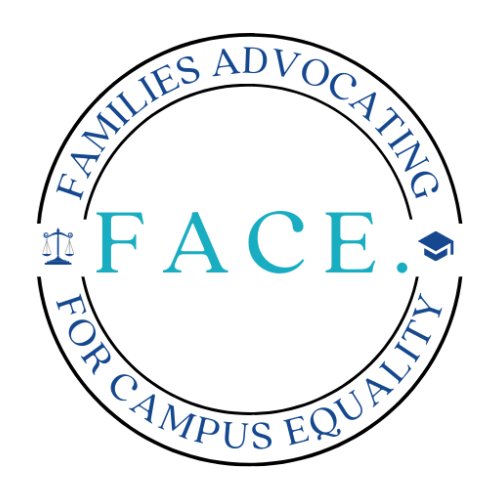What to Do if You’ve Been Wrongfully Accused of Sexual Misconduct
Realize help is available. There are organizations, such as FACE, and attorneys (Title IX) dedicated to helping students and faculty wrongfully accused of sexual misconduct. With this help, many individuals have been able to successfully defend themselves in campus tribunals or restore their reputations and educations through our US courts of law.
Assemble a support team you can TRUST. Contact your family immediately and recommend they consult FACE, especially our advice from FACE parents. Having some of your most ardent supporters in your corner will be essential logistically and emotionally as you face school administrators or Title IX officials.
Do not trust ANY college or university officials. These officials are under political and societal pressures that, in many ways, require them to assume those who complain of sexual misconduct are “survivors” and that students and faculty members are very rarely accused wrongfully. These pressures could drive school officials, students, and even some of your friends to assume you are guilty.
Do NOT use your college or university email to discuss your case with anyone on or off campus. Your email account and any Zoom recordings are not secure and are the property of the school. Any evidence contained in these emails or Zoom recordings should be offloaded immediately.
Contact a Title IX attorney, FACE, or consult our website, especially advice from FACE students before you discuss ANY aspect of the complaint made against you with anyone outside of your family. We strongly recommend you only attend any meetings or participate in any phone calls with school officials once you can be accompanied by a parent, attorney, or advocate (who is NOT loyal to the school). At no time should you meet or speak with law enforcement or campus security without an advocate, preferably an attorney, present.
Find and preserve any evidence quickly. Immediately locate and save every email, text message, video/audio recording, or other relevant communication to the accusation against you. A trained investigator needs to talk to each person who could be a witness to what happened and what happened before and after. The truth is only on your side if you preserve evidence to support it.
As of August 2024, you will have to request certain information necessary to defend yourself formally (in writing). 1) Request copies of or access to all training materials and methods used by those involved in investigations and adjudications of misconduct (i.e., coordinators, administrators, investigators, adjudicators). 2) Request access to all the evidence against you, not just a summary or description of the evidence. This request will probably need to be ongoing because schools may not provide you with new or updated evidence as the investigation proceeds. Warring some schools may label some evidence as irrelevant or impermissible, which may obscure it.

